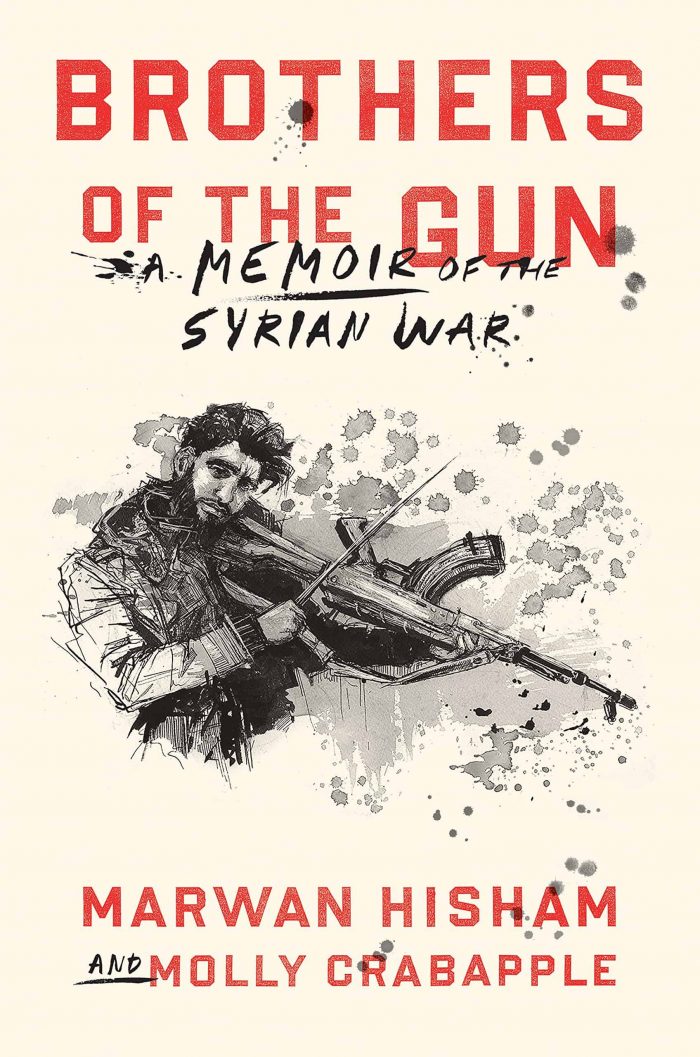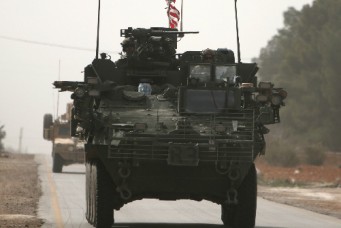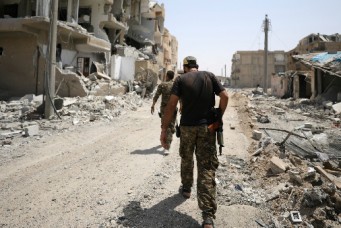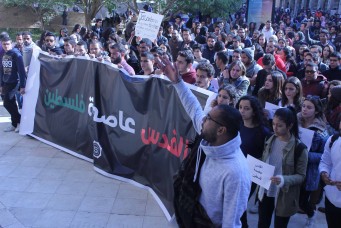Raqqa Youth and the Devastation of War
How Raqqa Youth Survived ISIS
Brothers of the Gun: A Memoir of the Syrian War. By Marwan Hisham and Molly Crabapple. One World, New York, 2018. 320 pp.
In his newly released memoir Brothers of the Gun, Marwan Hisham, with co-author Molly Crabapple, takes us to Raqqa, Syria during Ramadan 2011—the early months of the Arab Spring-inspired uprising against the Syrian Ba’ath Party dictatorship. Hisham and his two closest friends are young men who launch themselves into the long-awaited revolution, unaware of the vicious war for power that will take hold of their country and redirect each of their lives.
Marked by Crabapple’s provocative ink sketches, Brothers of the Gun tells the vivid human tale of Syria’s northern city of Raqqa from a local perspective, presenting a much-needed perspective on the contemporary narrative of Syria. It is the story of Raqqan youths and the day-to-day lives of the people, who suffer and survive under waves of dictatorship, extremism, and the chaos in between.
Brothers of the Gun presents a detailed account of young Hisham’s life in Raqqa and the memories of two brothers Nael and Tareq, his friends. The three men find themselves in the midst of a complex and ever-evolving war as their city passes through the hands of the Syrian regime, the opposition forces, and in later years, the infamous jihadist group, the Islamic State in Iraq and Syria (ISIS). Despite their shared history and enthusiasm for the revolution, the young men end up at different endpoints: a journalist in exile, an opposition fighter killed on the frontlines, and an Islamist militant.
Hisham grew up in a poor neighborhood of Raqqa and was sent to a religious boarding school in the countryside of neighboring Aleppo at the age of twelve. A curious teenager, Hisham struggled to reconcile the simultaneous Muslim religious teachings with the Syrian government’s Arab Ba’athist indoctrination—both taught at his school. He found solace, however, in English literature, which he went on to study at university. Hisham’s best childhood friend, Nael, was a talker, a charmer, and an artist, who like Hisham left their hometown to pursue a degree in fine arts that led him to the Damascus art scene. Tareq, Nael’s younger brother, left Syria to study Arabic literature in Beirut, but as the revolution evolved, all three men returned to Raqqa.
Like most Syrians, Hisham, Nael, and Tareq found their lives upturned by the war. During one protest in Raqqa, Nael was arrested by regime forces. He was released soon after, forever changed by what he witnessed in detention. As rebel forces formed and captured Raqqa in 2013, Nael, the aspiring artist, decided to join the armed rebellion and became Abu Omar, a revolutionary nom de guerre. During an offensive the rebels initiated against Al-Assad regime outpost Division 17, Nael was killed by a mortar shell on the frontline.
Tareq was devastated by his older brother’s death, and in his grief, was persuaded to join a military camp organized by the Salafist militia Ahrar Al-Sham—a group that had dominance over Raqqa in 2013. With a Kalashnikov on his shoulder, Tareq fought against the Al-Assad regime, ISIS, and Kurdish militias. His views were sharply different from those of Hisham; but the two men were bound by their love for Nael, and remained close friends.
ISIS took control of Raqqa in 2014 after fierce fighting with rebel forces, establishing a key stronghold in Syria’s north that would later become its de facto capital. Tareq retreated from Raqqa with his group of Ahrar Al-Sham soldiers, while Hisham remained a resident in the city now filled with ISIS followers from across the globe who migrated to live and defend their promised utopian Islamic state.
While living in a dingy basement under ISIS control, Hisham observed the debates on Twitter about his country and decided to engage with them. He tweeted about Raqqa in English and attracted the attention of Western media, launching his career in “secret journalism.”
It was at this time the two Brothers of the Gun authors, Crabapple and Hisham, began to collaborate, producing their unique format of what they called “art crime” stories that illustrated the horrors endured by the people of Raqqa for Vanity Fair. Hisham went on to travel to Iraq’s Mosul, also under the control of ISIS, and secretly capture photographs and report on the situation there. Putting his life on the line, Hisham went on a couple of other media assignments for various Western publications.
Some of the most notable parts of Hisham’s memoir are his interactions with ISIS fighters and their families, which portray the lifestyle and function of the jihadist group in a way that has been largely underreported.
This memoir is not a chronicle of Raqqa’s war history, but rather a story of hope, fear, devastation, uncertainty, and bravery told through a concise and personal narrative. It is an essential read for anyone who seeks to understand what Raqqa has endured, each chapter a flashback into Hisham’s life in the city of his birth.
While this book succeeds in guiding readers through the personal journey of its narrator, it lacks in having enough clear connections to the broader context of the Syrian conflict. A reader who is unfamiliar with the chronology and details of the Syrian civil war may be confused by the timeline of events presented in Brothers of the Gun and would have benefited from a greater sequential record of events occurring in Raqqa and across Syria.
Nonetheless, Hisham and Crabapple have produced an indispensable read that features how ordinary youths change, adapt, and resist, in different forms, in the face of unceasing injustices. It leaves the reader informed, yet puzzled, wondering how the Raqqa catastrophe could have been avoided.
Abdulrahman al-Masri is a journalist and analyst who covers Middle East politics and security and foreign policy. He is also a fellow with the SecDev Foundation. He has written for the Arab Weekly, NewsDeeply, the Atlantic Council, USA Today, and OpenCanada, among others. On Twitter@AbdulrhmanMasri.






